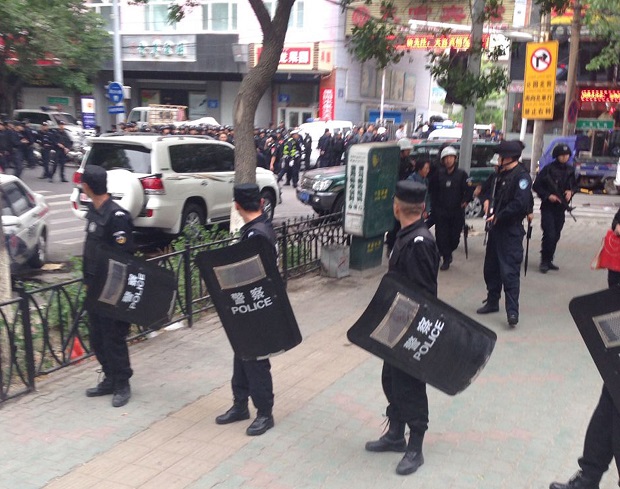31 dead, scores wounded in attack in China’s Xinjiang

In this photo released by China’s Xinhua News Agency, police officers stand guard near a blast site which has been cordoned off, in downtown Urumqi, capital of northwest China’s Xinjiang Uygur Autonomous Region, Thursday, May 22, 2014. Attackers crashed a pair of vehicles and tossed explosives in an attack Thursday near an open air market in the capital of China’s volatile northwestern region of Xinjiang, leaving an unknown number of people dead and injured, state media reported. AP
BEIJING– Attackers killed at least 31 people Thursday when they ploughed two vehicles into a market and threw explosives in the capital of China’s Xinjiang region, in what authorities called the latest “severe terrorist incident” to hit the Muslim Uighur homeland.
More than 90 people were also wounded when two off-road vehicles drove into a crowd in Urumqi, with one of them exploding, the regional government’s Tianshan web portal said, in an attack with echoes of a fiery car crash in Tiananmen Square last year.
Pictures posted on Sina Weibo, a Chinese equivalent of Twitter, showed victims lying in a tree-lined street, as others sat on flimsy stools.
Flames rose in the background, while other images showed smoke billowing over market stalls behind a police roadblock. None of the photographs could immediately be verified.
Chinese President Xi Jinping pledged to “severely punish terrorists and spare no efforts in maintaining stability”, the official Xinhua news agency reported.
Article continues after this advertisementXinjiang, a vast and resource-rich region in China’s far west, has seen periodic violence which has increased and sometimes spread beyond it in recent months.
Article continues after this advertisementBeijing says it faces terrorism from a violent separatist movement there, driven by religious extremism and foreign groups, while critics point to economic inequality and cultural and religious repression of Uighurs as causes of unrest.
Tianshan described the attack as a “severe, violent terrorist incident”.
“Thugs broke through protective metal barrier by driving two vehicles, colliding with the crowd and detonating explosive devices, causing the deaths of 31 people and injuring 94,” it said.
A witness at the market told Xinhua he heard a dozen “big bangs” during the attack, which happened at about 7:50am (2350 GMT Wednesday), when Chinese morning markets, which usually sell fresh groceries, are commonly crowded with shoppers.
“There were multiple strong explosions in the morning market at the Cultural Palace in Urumqi,” wrote one Weibo poster who said he was less than 100 metres (yards) from the scene.
“I saw flames and heavy smoke as vehicles and goods were on fire while vendors escaped leaving their goods behind.”
– Series of attacks –
China has seen a series of attacks in recent months targeting civilians that authorities have blamed on separatists from Xinjiang.
On April 30, the final day of a visit by Xi to the region, assailants armed with knives and explosives carried out an attack at a railway station in Urumqi, killing one person and wounding 79. Two attackers also died.
The main plotter had formulated plans from abroad, then eight days before the incident ordered 10 people to make an explosive device and choose a target, Xinhua said in a later report.
In March attackers went on a stabbing spree at a railway station in the southwestern city of Kunming, killing 29 people and wounding 143 in an incident dubbed “China’s 9/11” by state media. Four of the assailants were shot dead by police.
In 2009 ethnic riots erupted in Urumqi between Uighurs and the country’s majority Han Chinese, leaving 200 people dead and prompting a security crackdown.
China has dramatically increased the number of armed patrols on its streets in response to the spate of violent incidents.
Thursday’s blasts came a day after state media reported that courts in Xinjiang jailed 39 people for offences including spreading “terrorist videos”.
The 39 were given prison sentences of up to 15 years, the state run China News Service said, adding that several had “organised, led and participated” in terrorist organisations.
Critics say the security threat in Xinjiang is exaggerated by Beijing to justify hard-line measures, and that tensions are driven by cultural oppression, intrusive security measures and immigration by majority Han Chinese which have led to decades of discrimination and economic inequality.
Beijing says that its policies in the region have brought prosperity and higher living standards.
Thursday’s attack sparked outrage on Sina Weibo, with many calling for action against the assailants.
“We should learn anti-terrorist methods from the US and Israel which is about talking less nonsense, showing less mercy and killing them all,” said one poster.
“Whatever demands they have, they shouldn’t hurt innocent people!” said another.
RELATED STORIES
China vows to address stifling smog, terror threat